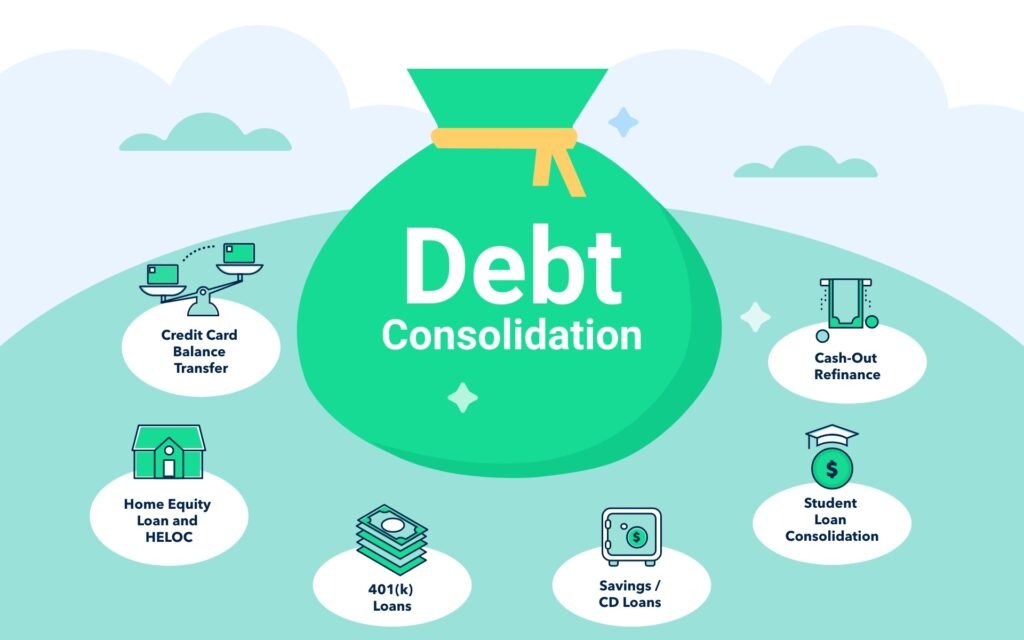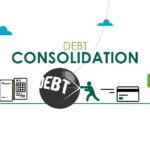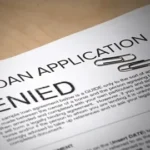Struggling with poor credit but need a debt consolidation loan? Learn how to qualify with bad credit, the best lenders, and tips to improve your chances of approval.
What Is a Debt Consolidation Loan for Bad Credit
A debt consolidation loan for bad credit is a type of personal loan that helps borrowers with low credit scores combine multiple debts into a single monthly payment. The goal is to simplify debt repayment and potentially lower overall interest costs—even if your credit is less than ideal.v
Bad credit is usually defined as a credit score below 580, but some lenders still approve loans for those in this range.
Challenges of Qualifying with Bad Credit
Borrowers with bad credit face several hurdles:
- Higher interest rates
- Lower approval odds
- Smaller loan amounts
- More documentation required
That said, many lenders today offer flexible solutions for subprime borrowers. It’s still possible to qualify if you know where to look—and how to present yourself as a trustworthy borrower.
Can You Get Approved with a Low Credit Score?
Yes, you can. While traditional banks may decline your application, online lenders, credit unions, and peer-to-peer platforms often approve bad credit borrowers—especially if you meet other requirements like stable income or a co-signer.
Some lenders even specialize in credit scores as low as 500.
What Lenders Look For Besides Credit Score
Even with bad credit, you may be approved if you meet other criteria:
- Stable income: Proof of consistent income (pay stubs, tax returns)
- Low debt-to-income ratio (DTI): Ideally under 40–50%
- Employment history: 1+ year with current employer helps
- Bank account in good standing
- No recent bankruptcies or defaults
Lenders will also consider your ability to repay, not just your score.v
Steps to Qualify for a Debt Consolidation Loan with Bad Credit
1. Check Your Credit Report
Start by pulling your credit report from Experian, Equifax, and TransUnion. Check for:
- Errors or incorrect accounts
- Outdated information
- Missed payments you can dispute or resolve
Fixing errors can improve your score within 30–60 days.
2. Pre-Qualify with Multiple Lenders
Use online platforms to compare lenders and see prequalified rates without a hard inquiry. Look for:
- APR ranges
- Loan term options
- Total monthly cost
- Origination fees
Some top platforms for bad credit include:
- Upstart – Accepts credit scores as low as 300
- Avant – Designed for subprime borrowers
- LendingPoint – Fast approvals with flexible terms
- OneMain Financial – Branch access and secured loan options
3. Consider Using a Co-Signer
If your credit is below 580, adding a co-signer with good credit can significantly improve your chances—and help you secure a lower interest rate.
Just make sure the co-signer understands their responsibility: if you miss payments, they are legally liable.
4. Offer Collateral
Some lenders allow you to take out a secured loan using assets like:
- Your car title
- A savings account
- Home equity (if applicable)
Secured loans come with better rates but carry the risk of losing your asset if you default.
5. Reduce Existing Debts
Paying down small balances before applying can:
- Improve your debt-to-income ratio
- Increase your available credit
- Boost your credit score slightly
This can mean the difference between a 20% APR loan and a 12% APR loan.
6. Write a Clear Loan Purpose
In your application, clearly explain why you want to consolidate your debts. Lenders appreciate borrowers who are focused on:
- Paying off high-interest debt
- Avoiding future financial strain
- Improving financial habits
A strong loan purpose adds credibility—even with bad credit.
What Interest Rates to Expect
With a credit score under 600, you may receive APR offers between 18% and 36%. However, this still may be lower than the rates on some credit cards, which often exceed 25%.
Here’s a quick breakdown:
| Credit Score Range | Typical APR Range |
|---|---|
| 300–579 | 22% – 36%+ |
| 580–639 | 17% – 29% |
| 640–699 | 10% – 24% |
Tip: If the loan doesn’t reduce your overall cost of debt, reconsider applying—or find a co-signer to reduce the rate.
Pros and Cons of Consolidating with Bad Credit
✅ Pros
- One monthly payment
- Potentially lower interest
- Clear payoff timeline
- Improves payment history (if paid on time)
❌ Cons
- Higher APR than prime borrowers
- Possible fees (origination, late payment)
- May require collateral or co-signer
- Doesn’t solve poor financial habits
Tips to Boost Approval Odds Fast
- Pay utility and phone bills on time for the next 2–3 months
- Open a secured credit card to build score
- Avoid applying for multiple loans at once
- Add recurring payments to your credit report using Experian Boost
- Reduce small debts to improve utilization
Alternative Options If You’re Denied
Balance Transfer Cards
Some offer 0% APR for 12–18 months. Great for smaller debts—if you qualify.
Debt Management Plans (DMP)
Offered by non-profit credit counseling agencies. They negotiate with creditors and help reduce interest.
Peer-to-Peer Lending
Platforms like LendingClub may be more lenient with bad credit.
Secured Loans
Using your car or savings account as collateral could unlock better rates.
Credit Union Loans
Often more flexible than banks and friendlier to low-credit borrowers.
Realted Article Quiers
- qualify for a personal loan with bad credit
- loan options for low credit score
- consolidate credit card debt with bad credit
- bad credit debt consolidation lenders
- poor credit personal loans
- how to get approved for a loan with bad credit
- fix credit to get a loan
- bad credit consolidation tips
- pre-qualify for debt consolidation
- unsecured loan approval strategies
Frequently Asked Questions
Can I get a debt consolidation loan with a credit score under 550?
Yes, but your options will be limited and interest rates will be high. Look for lenders like OneMain Financial or consider using a co-signer.
Will my credit score drop if I apply for a consolidation loan?
It may dip slightly due to a hard inquiry, but responsible use can improve your score over time.
How much can I borrow with bad credit?
Most bad credit lenders offer between $1,000 and $25,000, depending on income, DTI, and lender criteria.
Do lenders look at employment history?
Yes. Stable employment (6 months–1 year+) improves your odds.
Should I work with a debt consolidation company?
Only use trusted, accredited firms (like those with NFCC certification). Avoid companies that charge upfront fees or make unrealistic promises.
Conclusion
Even with bad credit, a debt consolidation loan is within reach. The key is preparation: know your credit standing, improve what you can, shop around for lenders, and consider using a co-signer or collateral.
A strategic consolidation loan can help you regain control of your finances, reduce your monthly payments, and build better credit over time. Take action today, and make your next loan work for your future—not against it.


